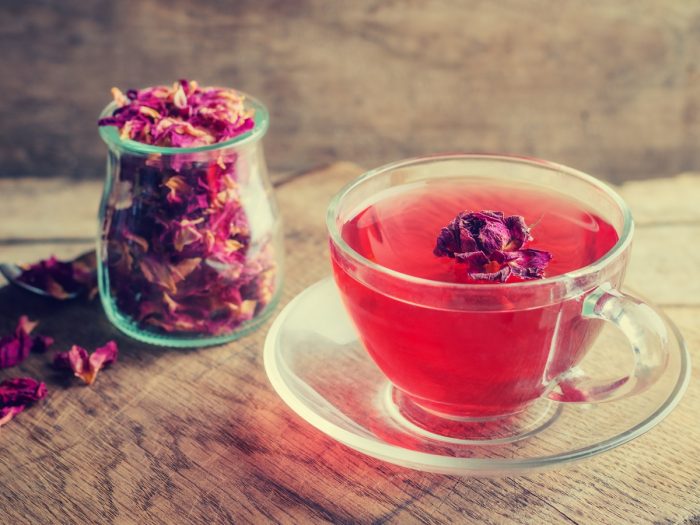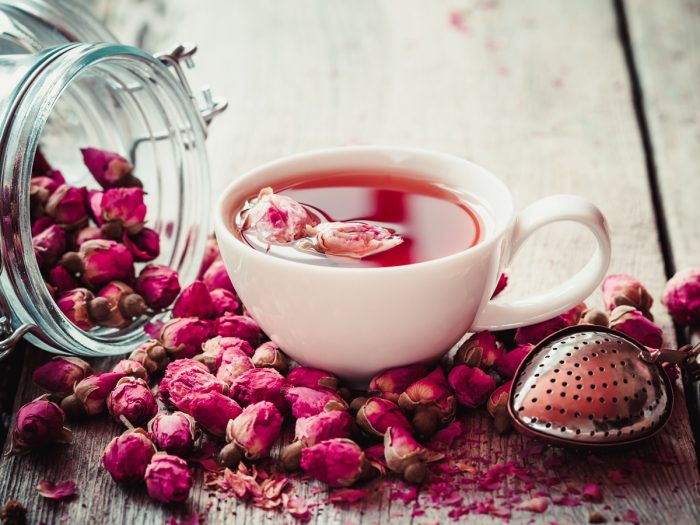Rose tea has been known to have many uses in health and wellness throughout history. It is thought to ease menstrual pains, boost the immune system, speed healing, improve digestion, detoxify the body, stimulate mood and regulate the sleep cycle.
What is Rose Tea?
Rose tea, quite simply, is made from whole rose blossoms or the rose petals themselves (after being dried). This is a popular Middle Eastern variety of tea but is enjoyed around the world. Perhaps, the many benefits of this tea are a result of the possible high concentrations of vitamin C, polyphenols, vitamin A, various minerals, myrcene, quercetin, and other antioxidants. [1]
Benefits of Rose Tea
Adding rose tea to your health regimen is thought to help relieve a variety of conditions which may include arthritis to menstrual cramps. Some also consider this tea to be a boon to digestive issues and insomnia. Unlike rosehip tea, which is made from the fruit of the rose plant, this tea is derived from the whole blossoms (or petals).
May Ease Menstrual Discomfort
Probably, one of the best home remedies for painful or heavy periods is rose tea, as it may not only help to regulate hormones and maybe ease uterine congestion but also eliminate cramping and mood swings that can often be associated with menstruation. More research is needed, but preliminary results are promising. [2]

The perfect cup for cozy winter mornings Photo Credit: Shutterstock
May Aid in Elevating Mood
The possible naturally uplifting quality of tea can make it an excellent choice for those who may be feeling down, depressed, or overly stressed. While there is no clinical research to support the claim, those who believe in the benefits of alternative medicine may suggest rose tea may have a possibly beneficial effect.
May Improve Immune System
As with many different plants and flowers used to make herbal teas, rose tea is possibly high in vitamin C, which is probably one of the most important vitamins in our body. Vitamin C is known to be an essential part of our immune system as it can stimulate the production of white blood cells and functions as an antioxidant, thus possibly lowering oxidative stress. [3]
Might Lower Risk of Chronic Disease
Probably, one of the major causes of chronic diseases is oxidative stress. This is caused by free radicals, which are possibly the natural byproducts of cellular metabolism that can cause healthy cells to mutate. By increasing the number of antioxidants in our body, which may include myrcene, quercetin, and myrcene from rose tea, it is possible to lower your risk of experiencing some chronic health conditions. [4]
May Help Regulate Sleep
The potential natural sedative property of rose tea can make it a wonderful beverage to finish a night, allowing it to reduce stress, and plausibly regulate sleep patterns and Circadian rhythm. If you suffer from insomnia, or regularly have disturbed or interrupted sleep, you may try this tea before going to bed. You may find it gives you a good night’s sleep! [5]
May Aid in Decreasing Respiratory Distress
Commonly prescribed or recommended for soothing the respiratory tract, lungs, and throat rose tea can be an excellent choice if you are struggling with a cold or flu. It may also help to expel mucus and phlegm, which can be where bacteria and other pathogens can live and thrive.
May Aid in Digestion
The antibacterial properties of this tea quickly go to work on many infections which may include that of the gastrointestinal tract or gut. It can help to rebalance the microflora in the intestines and possibly relieve digestive issues which may include constipation, cramping, bloating or diarrhea. That being said, rose tea may also act as a laxative, particularly if you drink more than 2 cups per day. So, you may consume the rose tea in moderation and monitor how your body reacts when you first begin drinking this beverage. [6]
Ways to Make Rose Tea
You can make rose tea from the flowers in your garden, along with a few other ingredients, such as honey, green powder tree, or black tea. Those last two ingredients can be mixed in if you want rose-flavored tea, rather than pure rose tea, as the flavor can be a bit overwhelming for some people. The basic recipe, however, is quite simple. [7]
Recipe

Delightful Rose Tea Recipe
Ingredients
- 1 cup freshly cut or dried rose petals/blossoms
- 3 cups water hot, but not boiling
- honey, to taste
- 1/4 cup green tea leaves optional, if you want rose-flavoured green tea
- 1/4 cup black tea leaves optional, if you want rose-flavored black tea
Instructions
- If using fresh rose petals, thoroughly rinse them with water before use.
- Place the petals in a saucepan of hot water, but do not allow it to boil. If you are making an alternate version of black green tea, mix in the leaves at this step and allow them to steep aside the rose petals.
- Cover the saucepan and let the rose petals steep for approximately 5 minutes.
- Strain the mixture, leaving the rose petals behind.
- Add the honey to taste, if necessary.

Notes
Side Effects of Rose Tea
In terms of side effects, rose tea probably does not contain toxic components and is not known as a common allergen. However, with a number of powerful polyphenols and antioxidants, an excess amount of this tea may cause the following: [8]
- Headache
- Nausea
- Vomiting
- Fatigue
Drinking 1-2 glasses of moderately strong rose tea should probably not have any negative side effects for the majority of people. Due to a lack of research, pregnant and breastfeeding women are discouraged from using this tea.

